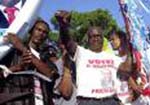Haitians vote for democracy
Haitians jammed polling stations Tuesday as U.N. peacekeepers fanned out to guard the country's first presidential election in nearly six years, a vote widely viewed as a key step in steering this bloodied, impoverished nation away from collapse. Clutching newly minted voter ID cards, about 1,000 people lined up before dawn at a polling station in the Port-au-Prince area of Delmas, waiting for electoral officials to open the doors.

Polls opened at 6 a.m. EDT, but voting was delayed at several polling stations in the capital, said David Wimhurst, a U.N. spokesman. Outside a polling station in the downtown slum of Bel-Air, hundreds of waiting voters snaked along rutted, trash-strewn streets.
"Haitians are mobilized for change. That's why there's so many people in the street this morning," said Jean Joseph, 44, as he went to cast his ballot. U.N. special envoy to Haiti Juan Gabriel Valdes said he was happy to see long lines during a tour of a polling station near the St. Pierre church in Bel-Air.
"It's a victory for democracy, a victory for Haiti," Valdes said. "It's calm and people are lining up to exercise their right to vote." Minutes later, however, a scuffle broke out at the station, when voters began shouting, pushing and shoving to keep their position in line. Several fainted and were carried out.
Authorities urged Haitians to vote in large numbers under the protection of thousands of U.N. peacekeepers, saying Tuesday's election was important in reversing Haiti's cycle of despair. "Haiti's future depends on this vote," said Jacques Bernard, director general of the electoral council. "Good elections are the only solution to saving our nation."
Poll workers were slow to open the doors at some stations, waits were long and someone stole a batch of ballots, but there were no reports of major violence, Wimhurst said. "So it's going well far," Wimhurst said.
More than two hours after the official opening of the polls, some stations had yet to open, including one just outside the seaside slum of Cite Soleil. The shantytown had no polling stations of its own because authorities deemed the area too dangerous.
More than 5,000 people formed a line at the polling station nearest to Cite Soleil as election workers assembled the ballot boxes. A wall of people crushed toward the entrance and shouted in anger. "We have the right to vote!" chanted several voters.
Gunshots could be heard from within the slum, which is home to some 200,000 people, but the source of the shooting could not be determined. At a polling station at a high school in the upscale Petionville area of the capital, a small group of Haitian police tried to keep an anxious crowd at bay, using batons at one point to beat back a voter.
Helicopters, truck and even mules ferried election supplies into remote corners of the Caribbean nation, which has never seen democracy fully take root. Only one elected president, Rene Preval, has served out his term in office, from 1996 to 2001.
Preval, a 63-year-old agronomist, is now the front-runner, according to opinion polls. Other top contenders among the 33 candidates are Charles Henri Baker, 50, whose family runs factories in the assembly-for-export industry, and Leslie Manigat, 75, who was president for five months in 1988 until the army ousted him when he tried to shake up its high command.
Also running are a former rebel in the insurgency that forced President Jean-Bertrand Aristide from office in February 2004 and a former army officer accused in the death of a Haitian journalist. If no candidate wins a majority, a March 19 runoff would be held between the top two candidates. Hundreds of candidates are also running for 129 parliamentary seats, reports the AP.
Subscribe to Pravda.Ru Telegram channel, Facebook, RSS!


